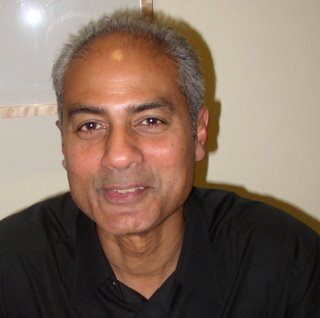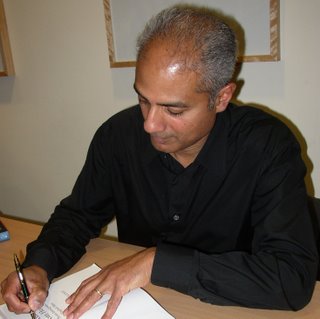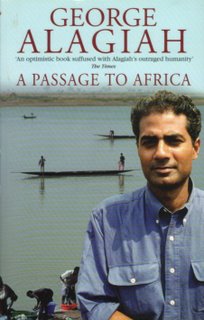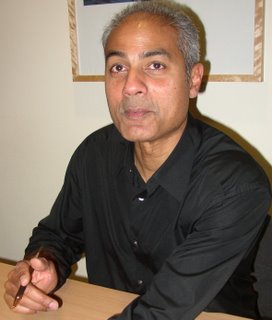George Alagiah and A HOME FROM HOME
The last event of the 2006 Chester Literature Festival was a talk by George Alagiah who currently reads the main evening news at 6 o'clock on the BBC.
I have followed Mr Alagiah's career with some interest since we were at the university of Durham at the same time; he had taken a sabbatical position after graduating the year before and I was a fresher.
A couple of weeks after I 'went up' to Durham I noticed a small notice encouraging those people interested in producing an alternative prospectus for the university - one that would show what the university was really like from the undergraduate's point of view - to meet in one of the sabbatical offices at the Student's Union. It was there that I first encountered George Alagiah.
I don't think I ever saw the outcome of this project but I did get involved and volunteered to interview the Secretary of the university on the admissions procedure.

This Secretary, someone told me, could be a little ferocious, which made the idea even more attractive. I still wanted to be a journalist then (even though I was studying the sciences) and I thought the experience would do me good.
However I have to report that I found this Secretary to be disappointingly courteous. He answered all my questions (which subjects required the lowest grades for admission, for instance) and I wrote up the report and handed it to George at the Student's Union for the proposed publication. He duly expressed his utterly huge and profound admiration at my great feat (which in truth was actually not that impressive) and at the end of the year invited me to his party. I didn't go. By that time I had come to realise that I had to make a choice between getting a good science degree and becoming a student journalist.
I found the Student's Union newspaper at Durham quite unwelcoming - in fact I rarely found anyone there. I suppose I didn't persist enough - but it did seem to me it was far easier for an Arts student to become involved than a science student. The science student's time-table was crammed with lectures and practicals and the labs were a good walk from the science faculty; whereas the arts students seemed to have the odd lecture or tutorial and the rest of their time was their own. Soon, after phoning Shirley Williams (who was one of the heads of a new political party) for an interview (and being astonished at the ease at which I got through to her), I gave up - I had got a third class in one of my papers which shocked me into working.
I decided to get my degree and then try my hand at professional writing, but in the end it took a good few more years than that to get anything published.

But I digress. The George Alagiah I encountered in that Student Union office is quite a different man from the one I heard last night. He pointed this out himself in a short clip of film he showed at the beginning of the talk. I found it poignant: first we saw the photograph of a young Indian child in some exotic warm location and then the voice of that child - high-pitched with a pronounced Indian accent speaking an English that was clipped with a distinctly colonial register. Then it cut to an image and sound that was familiar to millions of British viewers - George Alagiah reading the six o'clock news - a broad, paler face with grey thinning waves of hair and the voice deep, reassuring, archetypically twenty-first century BBC British.
'We've come a long way.' he said to me when I gave him a copy of my novel after the talk as a keepsake. He didn't remember me of course; people quite often don't remember younger companions, I find. But he remembered the prospectus, and he remembered the name of the man I interviewed.

George Alagiah has written two autobiographical books. The first, OUT OF AFRICA, I read soon after it came out about four years ago and I can vouch for its excellence. The sections on being a reporter in Africa are personal, interesting and in some parts very exciting and tense. I kept hoping there would be a section on Durham but, since the focus was Africa, there was very little. The part I liked the most was on his time in Sri Lanka, before his family made his first migration to Africa. I remember it as beautifully written and I would have loved to have read more. He pointed out the cultural change and this was a theme he came to again last night in his talk.
In his early childhood in Sri Lanka George Alagiah remembers:
'...the well at my grandfather's house in the little eastern town of Kalmunai as he poured cold water over me. From where I stood I'd look up to see this vast expanse of belly hanging over the knot of a sarong and, further up, a kindly, indulgent face smiling down at me.
There was always a black cigar in his mouth, even it seems at bathtime.'
In six more years, in 1967 at the age of 11 George Alagiah would be experiencing another sort of shower at his boarding school in Portsmouth, where his lack of a 'tan line' would lead eventually to the house joker explaining that:
'He hasn't got a tan because in bongo-bongo land they all run around with no clothes and they go brown all over!'
Then, says George Alagiah in his book A HOME FROM HOME,
'He laughed at his own joke and everybody joined in. And then I joined in too. I couldn't think of anything else to do.'
He explains he was embarrassed, hurt, and wanted to run away and cry but all he did was stood and smiled and wished he could disappear in the steam.

In his talk George Aligiah explained that this boy really wasn't a racist. He said that recently he had met this 'house joker' again and they had hugged and swapped jokes. I suppose it is the way of the child. They hurt those who stand out and are different - and there are so many ways to be different apart from colour.
Another attribute of children, George Alagiah says, is that they are natural integrators. A HOME FROM HOME is about George Alagiah's integration into British Society - 'from immigrant boy to English man'. He compares the child he was then with a child of today who is also seeking to integrate into the society around him. The child that he found, Joshua, lives in the Tower Hamlets area of London where 96% of the children (or their parents) are from a province of one county within Bangladesh. This means that Joshua, as a white child, is the one finding himself in a strange country and like the child that was George Alagiah wants to integrate; but when he invited his friends from school to a birthday party no one came.
It didn't used to be so bad. Older people in the community told George that they remembered the 'bad old days' - before 'multiculturalism' started in the 1960s when, despite the obvious racism, people had to get on to survive.
George Alagiah is careful to report just what is happening and, mindful of his position as a senior reporter for the BBC, is equally careful not to express his opinions of what should be done. For instance he is careful not to have an opinion on the wearing of veils or single faith schools; and when asked about these two issues he threw the questions back to the audience - phrasing them so that his opinions became quite clear.

One of the last questions caused him to contrast the attitude towards immigration in the USA and the UK. In the US, he said, they celebrate immigration with a fine museum and silver plaques at Statton island. The equivalent in the UK is a place called 19 Princelet Street in London, which housed waves of immigrants (including Huguenot silk workers who are my ancestors). It is, says George Alagiah, in contrast to fine museum at Statton Island, a building under threat of demolition.
I am not sure I shall keep HOME FROM HOME or give it to my brother's widow, Y, who is a British-born Muslim whose parents come from India. Y has strong views (very similar to George Alagiah's) and has worked to become a valuable member of the mixed community around her. In some ways I think she is more integrated into English society than I am. All of us, to some extent, are descended from immigrants. Maybe the feeling of being proud to be British (which George Alagiah says is a good thing) comes from confidence in who you are and the people around you rather than from where and how long ago you came.
I have followed Mr Alagiah's career with some interest since we were at the university of Durham at the same time; he had taken a sabbatical position after graduating the year before and I was a fresher.
A couple of weeks after I 'went up' to Durham I noticed a small notice encouraging those people interested in producing an alternative prospectus for the university - one that would show what the university was really like from the undergraduate's point of view - to meet in one of the sabbatical offices at the Student's Union. It was there that I first encountered George Alagiah.
I don't think I ever saw the outcome of this project but I did get involved and volunteered to interview the Secretary of the university on the admissions procedure.

This Secretary, someone told me, could be a little ferocious, which made the idea even more attractive. I still wanted to be a journalist then (even though I was studying the sciences) and I thought the experience would do me good.
However I have to report that I found this Secretary to be disappointingly courteous. He answered all my questions (which subjects required the lowest grades for admission, for instance) and I wrote up the report and handed it to George at the Student's Union for the proposed publication. He duly expressed his utterly huge and profound admiration at my great feat (which in truth was actually not that impressive) and at the end of the year invited me to his party. I didn't go. By that time I had come to realise that I had to make a choice between getting a good science degree and becoming a student journalist.
I found the Student's Union newspaper at Durham quite unwelcoming - in fact I rarely found anyone there. I suppose I didn't persist enough - but it did seem to me it was far easier for an Arts student to become involved than a science student. The science student's time-table was crammed with lectures and practicals and the labs were a good walk from the science faculty; whereas the arts students seemed to have the odd lecture or tutorial and the rest of their time was their own. Soon, after phoning Shirley Williams (who was one of the heads of a new political party) for an interview (and being astonished at the ease at which I got through to her), I gave up - I had got a third class in one of my papers which shocked me into working.
I decided to get my degree and then try my hand at professional writing, but in the end it took a good few more years than that to get anything published.

But I digress. The George Alagiah I encountered in that Student Union office is quite a different man from the one I heard last night. He pointed this out himself in a short clip of film he showed at the beginning of the talk. I found it poignant: first we saw the photograph of a young Indian child in some exotic warm location and then the voice of that child - high-pitched with a pronounced Indian accent speaking an English that was clipped with a distinctly colonial register. Then it cut to an image and sound that was familiar to millions of British viewers - George Alagiah reading the six o'clock news - a broad, paler face with grey thinning waves of hair and the voice deep, reassuring, archetypically twenty-first century BBC British.
'We've come a long way.' he said to me when I gave him a copy of my novel after the talk as a keepsake. He didn't remember me of course; people quite often don't remember younger companions, I find. But he remembered the prospectus, and he remembered the name of the man I interviewed.

George Alagiah has written two autobiographical books. The first, OUT OF AFRICA, I read soon after it came out about four years ago and I can vouch for its excellence. The sections on being a reporter in Africa are personal, interesting and in some parts very exciting and tense. I kept hoping there would be a section on Durham but, since the focus was Africa, there was very little. The part I liked the most was on his time in Sri Lanka, before his family made his first migration to Africa. I remember it as beautifully written and I would have loved to have read more. He pointed out the cultural change and this was a theme he came to again last night in his talk.
In his early childhood in Sri Lanka George Alagiah remembers:
'...the well at my grandfather's house in the little eastern town of Kalmunai as he poured cold water over me. From where I stood I'd look up to see this vast expanse of belly hanging over the knot of a sarong and, further up, a kindly, indulgent face smiling down at me.
There was always a black cigar in his mouth, even it seems at bathtime.'
In six more years, in 1967 at the age of 11 George Alagiah would be experiencing another sort of shower at his boarding school in Portsmouth, where his lack of a 'tan line' would lead eventually to the house joker explaining that:
'He hasn't got a tan because in bongo-bongo land they all run around with no clothes and they go brown all over!'
Then, says George Alagiah in his book A HOME FROM HOME,
'He laughed at his own joke and everybody joined in. And then I joined in too. I couldn't think of anything else to do.'
He explains he was embarrassed, hurt, and wanted to run away and cry but all he did was stood and smiled and wished he could disappear in the steam.

In his talk George Aligiah explained that this boy really wasn't a racist. He said that recently he had met this 'house joker' again and they had hugged and swapped jokes. I suppose it is the way of the child. They hurt those who stand out and are different - and there are so many ways to be different apart from colour.
Another attribute of children, George Alagiah says, is that they are natural integrators. A HOME FROM HOME is about George Alagiah's integration into British Society - 'from immigrant boy to English man'. He compares the child he was then with a child of today who is also seeking to integrate into the society around him. The child that he found, Joshua, lives in the Tower Hamlets area of London where 96% of the children (or their parents) are from a province of one county within Bangladesh. This means that Joshua, as a white child, is the one finding himself in a strange country and like the child that was George Alagiah wants to integrate; but when he invited his friends from school to a birthday party no one came.
It didn't used to be so bad. Older people in the community told George that they remembered the 'bad old days' - before 'multiculturalism' started in the 1960s when, despite the obvious racism, people had to get on to survive.
George Alagiah is careful to report just what is happening and, mindful of his position as a senior reporter for the BBC, is equally careful not to express his opinions of what should be done. For instance he is careful not to have an opinion on the wearing of veils or single faith schools; and when asked about these two issues he threw the questions back to the audience - phrasing them so that his opinions became quite clear.

One of the last questions caused him to contrast the attitude towards immigration in the USA and the UK. In the US, he said, they celebrate immigration with a fine museum and silver plaques at Statton island. The equivalent in the UK is a place called 19 Princelet Street in London, which housed waves of immigrants (including Huguenot silk workers who are my ancestors). It is, says George Alagiah, in contrast to fine museum at Statton Island, a building under threat of demolition.
I am not sure I shall keep HOME FROM HOME or give it to my brother's widow, Y, who is a British-born Muslim whose parents come from India. Y has strong views (very similar to George Alagiah's) and has worked to become a valuable member of the mixed community around her. In some ways I think she is more integrated into English society than I am. All of us, to some extent, are descended from immigrants. Maybe the feeling of being proud to be British (which George Alagiah says is a good thing) comes from confidence in who you are and the people around you rather than from where and how long ago you came.
1 Comments:
Clare,
You've led me to two books I'd like to read, there. Thanks for the very interesting write up.
Post a Comment
Comments are subject to moderation.
<< Home